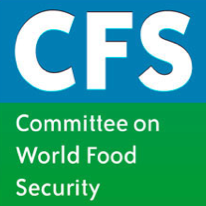During the Ministerial Meeting on Food Price Volatility, held during CFS 39, FAO Director-General José Graziano da Silva cited recent advances to tackle price volatility in part through the establishment of the High Level Task Force on Global Food Security and the creation of the Agricultural Market Information System by the Group of 20 (G20) to improve coordination and market transparency.
 20 October 2012: At the 39th Session of the Committee on World Food Security (CFS), delegates from across government, civil society and the private sector met to discuss coordination on policies to reduce food insecurity. In addition, several projects were launched on the sidelines of the Session.
20 October 2012: At the 39th Session of the Committee on World Food Security (CFS), delegates from across government, civil society and the private sector met to discuss coordination on policies to reduce food insecurity. In addition, several projects were launched on the sidelines of the Session.
CFS is an inclusive platform for stakeholders to work together to address policies that promote food security and nutrition.
CFS 39 took place in Rome, Italy, from 15-20 October 2012. Food and Agriculture Organization of the UN (FAO) Director-General José Graziano da Silva highlighted progress in cutting the number of hungry people since 1990, and in attempting to meet the Millennium Development Goal (MDG) for hunger reduction, but stressed the ultimate goal of zero hunger. He described the importance of CFS’ voluntary guidelines on responsible governance of tenure of land, fisheries and forests in the context of national food security, and he noted that the CFS will start a two-year process to agree on principles for responsible agricultural investment.
UN Secretary-General Ban Ki-moon underscored the “Zero Hunger Challenge” and its five objectives of: access to enough nutritious food all year round; no malnutrition in pregnancy and early childhood; sustainable food systems globally; greater opportunity for smallholder farmers, particularly women; and the reduction of food loss after production, and food waste.
The CFS featured policy round tables on food security for social protection, food security and climate change, and the state of food insecurity. In additional sessions, participants considered: global and regional initiatives and their linkages with the CFS; presentations on the High Level Expert Forum on Addressing Food Security in Protracted Crises; responsible agricultural investments; and lessons learned on country and regional experiences.
During the Ministerial Meeting on Food Price Volatility, the Director-General cited recent advances to tackle price volatility in part through the establishment of the High Level Task Force on Global Food Security and the creation of the Agricultural Market Information System by the Group of 20 (G20) to improve coordination and market transparency. Additional discussions focused on increasing transparency in agricultural market, coordination of international action, addressing increasing demand for food, and limiting the effects of food price volatility on the most vulnerable.
Also at the meeting, FAO and Sierra Leone signed an agreement for the FAO to provide technical help on food security. The project will focus on developing information network systems to facilitate planning implementation and monitoring and evaluation of food security. The FAO will provide assistance in establishing an early warning system, and strengthen capacity for disaster response in Sierra Leone.
Brazil and FAO also signed a US$20 million “South-South” agreement to channel Brazilian expertise in cotton production to other countries. The project will focus initially on Haiti and parts of the Southern Common Market (MERCOSUR) zone of South America. The intention is to build on the promise of South-South coordination with the FAO’s Regional Office for Latin America and the Caribbean, contributing support in expertise, technical information and mobilization of international networks.
The Hunger-Free Initiative for West Africa also was signed at the meeting, as a new project launched by Member States of the Economic Community of West African States (ECOWAS), Germany and FAO. The three-year project will build on programmes and policies to increase stakeholder engagement and political commitment in the region, considering a recent slowdown in the reduction of hunger across the region. The political commitment is expected to result in greater budgets to food and nutrition in West African countries. The Initiative is consistent with the framework provided by the Comprehensive Africa Agriculture Development Programme (CAADP), and builds on the Hunger Free for Latin America and the Caribbean Initiative. [FAO Press Release on Opening Ceremony] [FAO Press Release on Ministerial Meeting] [FAO Press Release on Sierra Leone Project] [FAO Press Release on Brazil/FAO Agreement] [FAO Press Release on Hunger-Free Initiative for West Africa] [CFS Agenda]